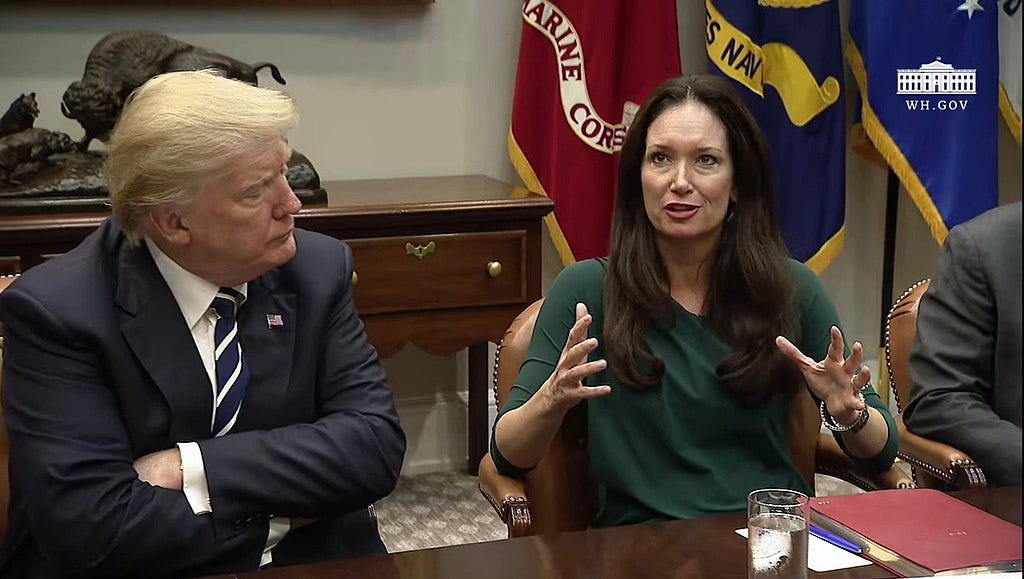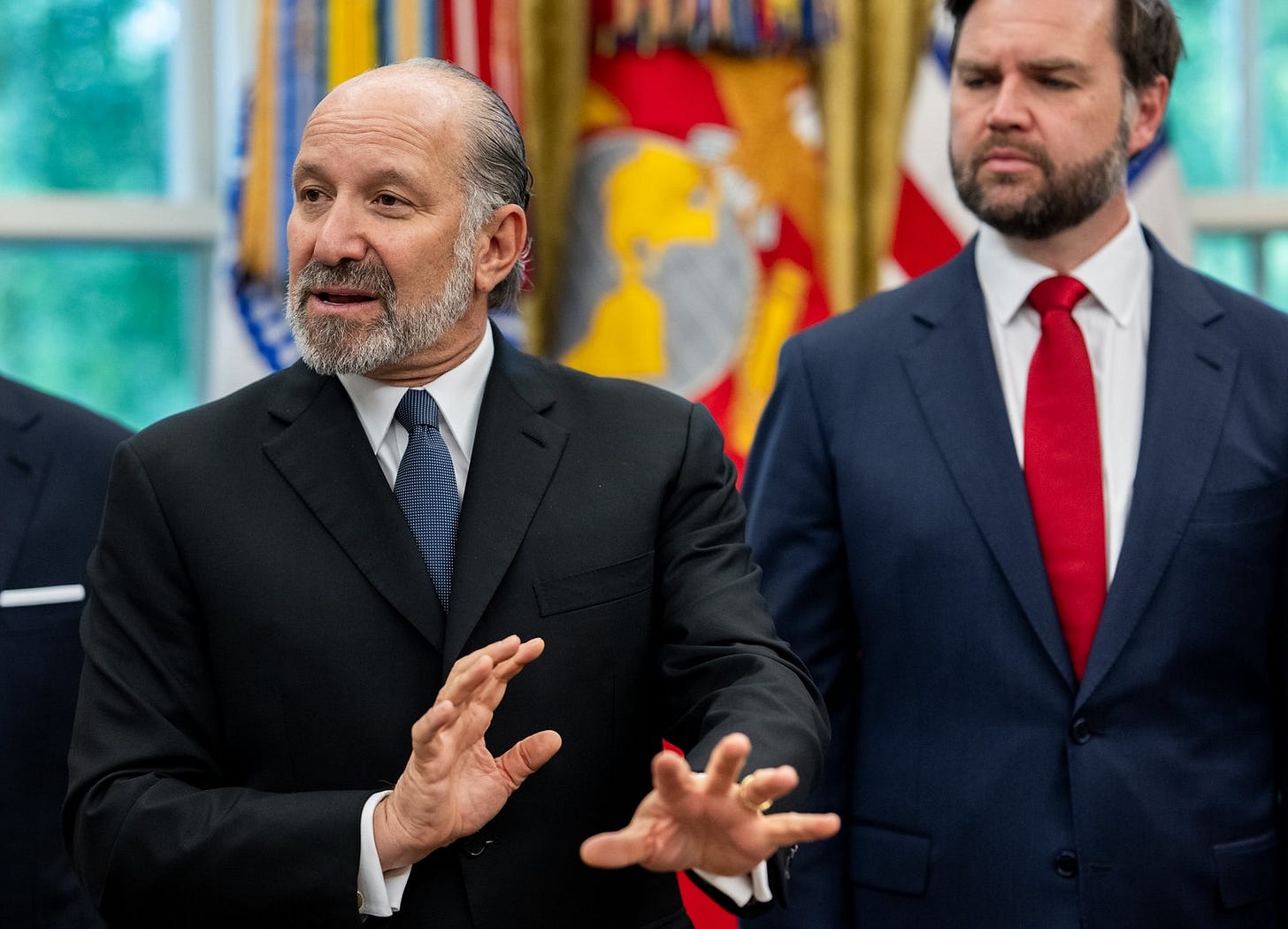Trail Notes
Those flip-flopping Trumparians / Ninety deals in 90 days! / Footing the bill for shoe tariffs / Big beautiful pork in the "big beautiful bill" / Trump's fool's gold card visa

Who’s Flip-Flopping Now?
One thing you can say about the Trump administration is that it holds firm to its positions—until it doesn’t. Over the past week, it held back U.S. weapons committed to Ukraine and then released them. On Monday night, the president said his new August 1 trade deal deadline may not be “100 percent firm.” The next day, he insisted it was. (By one count, Donald Trump has made 28 different flip-flops on tariffs since his April 2 “Liberation Day.”) And, on the issue of whether farm, restaurant and hotel workers should be given special dispensation because of the impact their deportations would have on those industries, its positions have been no, yes, no, yes, and no.
The most recent “no” came from Secretary of Agriculture Brooke Rollins, who declared on Tuesday: “There will be no amnesty. The mass deportations continue, but in a strategic way.” She wasn’t sure what the strategy might be, but she did pitch a fantastical solution in which deported workers would be replaced by a combination of "automation" and “American” workers who, in accordance with Republican dogma, would have to move out of their parents’ basements and work on farms so they can keep their Medicaid.
Step Right Up! Ninety Deals in 90 Days!
“Ninety deals in 90 days!” Of course, it was impossible. But it had such a nice carnival barker sound to it. Unfortunately, it was about international trade, not a sword swallower, and when the 90 days were up on Wednesday, only three deals had been announced. Two—one with the United Kingdom and the other with Vietnam—haven’t been finalized. The third—with China—has been accurately described as a “framework” of a deal.
So, Donald Trump, the Reality TV president, rewrote the script. First, he sent letters to 14 countries telling them what tariffs he’ll slap on their products exported to the United States unless they strike a deal. Naturally, he posted the letters on Truth Social because the show must go on. Then he waved his magic wand, otherwise known as an executive order, and moved the trade deal deadline to August 1, which may or may not be real. TACO, anyone?
Trump Barges into Brazil’s Business
The president sent out seven more tariff letters later in the week, including a particularly contentious one to Brazil. In it, he not only proposed setting an unusually high tariff of 50 percent on Brazilian goods imported into the United States but also cited what he described as a “witch hunt” against former Brazilian President Jair Bolsonaro, a Trump ally facing trial for attempting a coup. Trump went on to condemn the Brazilian government’s treatment of Bolsonaro, who he hailed as a “Highly Respected Leader throughout the World,” characterizing it as “an international disgrace.”
It was a flagrant example of Trump using financial muscle to attempt to impose his will on another country. Brazil’s current president, Luiz Inácio Lula da Silva, responded: “Brazil is a sovereign country with independent institutions that will not accept being abused by anyone.” The case against Bolsonaro, he added, “is the sole responsibility of the Brazilian Judiciary.”
Guess Who’s Going to Foot the Bill for Shoe Tariffs
Trump still wants the public to believe that tariffs are fees paid by countries that are exporting their goods to the United States, when they are, in fact, paid by the companies that import the products and then typically cover that extra cost by raising prices for American consumers.
Case in point: A recent “Tariff Pulse Survey” by the international accounting firm KPMG found that nearly 60 percent of the 300 companies surveyed reported that as of May, their profit margins were shrinking. As for where all this is headed, 77 percent of the respondents said they’re considering increasing their prices by at least a 5 percent in the next six months.
That ripple effect could become a wave for shoe retailers. The vast majority of shoes sold in the United States come from Bangladesh, Cambodia, China, Indonesia and Vietnam, some of which are facing tariffs as high as 40 percent. If they stay at that level, shoe prices could jump as much as 37 percent in the short term, according to estimates released this week by the Yale Budget Lab. Another example: In a call with financial analysts last week, Nike said it expects the tariffs to cost the company an extra billion dollars this year, which it largely hopes to cover with price increases.
Cashing In on Private Weather Forecasts?
The horrific, tragic flood of the Guadalupe River has brought more focus on the recent funding and staff cuts at the National Weather Service (NWS) and the National Oceanic and Atmospheric Administration (NOAA) and whether they undermined the agencies’ ability to issue timely warnings to Texas residents and campers.
Getting far less attention is how those cutbacks could potentially benefit Howard Lutnick, head of the Commerce Department, which oversees both agencies.

As you may remember, Project 2025, the Heritage Foundation’s blueprint for many of the Trump administration’s policies, called for dismantling the weather service and NOAA and instead “fully commercialize forecasting operations.” That could be a financial boon for Lutnick and his family. It’s a bit complicated, but let me explain.
Before taking his position running the Commerce Department, Lutnick was CEO of the financial firm Cantor Fitzgerald. Lutnick has turned that role over to his two sons, but he’s still in the process of divesting his holdings in the firm. Cantor Fitzgerald has investments in multiple weather and climate ventures, including a 13 percent stake in Satellogic, which bills itself as a federal contractor that can provide images of natural disasters and weather events in real time. Without the weather service and NOAA in the picture, Satellogic’s financial future—and that of the Lutnick family—would look a lot brighter.
Big Beautiful Pork in the Big Beautiful Bill
Tucked away in the 900-plus pages of the One Big Beautiful Bill Act are massive chunks of pork. Among them:
A Sen. Lisa Murkowski Alaskan special, which includes a huge deduction for business meals, but only for Alaskan fishing boats and processing plants;
A $17 billion expansion of a provision that already enables venture capitalists to avoid certain taxes;
Yet another tax break for oil and gas companies, which have benefited from mammoth subsidies for more than 100 years;
A $2 billion tax break for the rum industry;
A $26 billion commitment to establish a new $1,700 tax credit for folks who donate to groups that provide scholarships for children to attend private schools; and
A $1 billion provision that allows “spaceports” (launch sites) to sell tax exempt bonds like airports do. Oregon Sen. Ron Wyden described it as a “wedding gift” for Jeff Bezos (who recently got married in Venice), founder of the Blue Origin space company, and a “birthday gift” for Elon Musk, CEO of SpaceX.
Trump’s Gold Card Visa Loses Its Luster
Back in February, you may recall, the president made a big deal about what he called a gold card visa. The idea was that foreigners could get an instant visa by paying $5 million to the U.S. government. No muss, no fuss.
In April, the offer seemed to take a big step forward when Trump showed off a prototype gold card to reporters on Air Force One. When asked when it would become available, the president went to his go-to timeline: “About two weeks.”
That was more than two months ago, and it’s looking more like Trump’s beautiful gold visa may never happen. Immigration attorneys contend that the president has no power to create a new visa category on his own. In theory, it would require an act of Congress.
Randy Rieland is a former columnist at Smithsonian magazine, website director at the Discovery Channel, and senior writer at Washingtonian magazine.
Money Trail is a fiscally sponsored project of the Alternative Newsweekly Foundation, a 501(c)(3) public charity, EIN 30-0100369. Donations are tax-deductible to the extent allowed by law.






